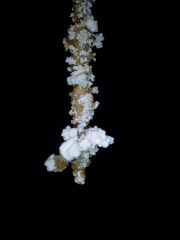Hydromagnesite (Inventory)/Moonmilk
From LagWiki
(Difference between revisions)
BigRedFoote (Talk | contribs) (added photo) |
|||
| Line 1: | Line 1: | ||
The '''Moonmilk''' field of the [[Hydromagnesite (Inventory)|Hydromagnesite]] section should be used to record any observation of moonmilk no matter its mineral content which may be hard to determine in the field anyway. | The '''Moonmilk''' field of the [[Hydromagnesite (Inventory)|Hydromagnesite]] section should be used to record any observation of moonmilk no matter its mineral content which may be hard to determine in the field anyway. | ||
| - | + | {{Inventory image|File:Moonmilk.JPG|Moonmilk on soda straw |thumb|}} | |
Moonmilk is a soft, white, pasty deposit. The texture is often described as having the consistency of cottage cheese. Small particles in the deposit account for the smooth texture. It can range from liquid to a dry powder depending upon the environment. The mineral content of moonmilk can be hydromagnesite, dolomite, huntite, [[Calcite (Inventory)|calcite]], [[Aragonite (Inventory)|aragonite]], or a variety of other minerals. It is most commonly found near the intersection of the [[Bedrock (Inventory)/Massive|massive reef]] with either the [[Bedrock (Inventory)/Forereef|forereef]] or [[Bedrock (Inventory)/Backreef|backreef]]. | Moonmilk is a soft, white, pasty deposit. The texture is often described as having the consistency of cottage cheese. Small particles in the deposit account for the smooth texture. It can range from liquid to a dry powder depending upon the environment. The mineral content of moonmilk can be hydromagnesite, dolomite, huntite, [[Calcite (Inventory)|calcite]], [[Aragonite (Inventory)|aragonite]], or a variety of other minerals. It is most commonly found near the intersection of the [[Bedrock (Inventory)/Massive|massive reef]] with either the [[Bedrock (Inventory)/Forereef|forereef]] or [[Bedrock (Inventory)/Backreef|backreef]]. | ||
Revision as of 20:56, 11 January 2012
The Moonmilk field of the Hydromagnesite section should be used to record any observation of moonmilk no matter its mineral content which may be hard to determine in the field anyway.
Moonmilk is a soft, white, pasty deposit. The texture is often described as having the consistency of cottage cheese. Small particles in the deposit account for the smooth texture. It can range from liquid to a dry powder depending upon the environment. The mineral content of moonmilk can be hydromagnesite, dolomite, huntite, calcite, aragonite, or a variety of other minerals. It is most commonly found near the intersection of the massive reef with either the forereef or backreef.
References
- Burgess, Harry. Canyons & Caves; Issue No. 3; Fall 1996; Moonmilk: http://www.nps.gov/cave/planyourvisit/upload/c&c3.pdf

